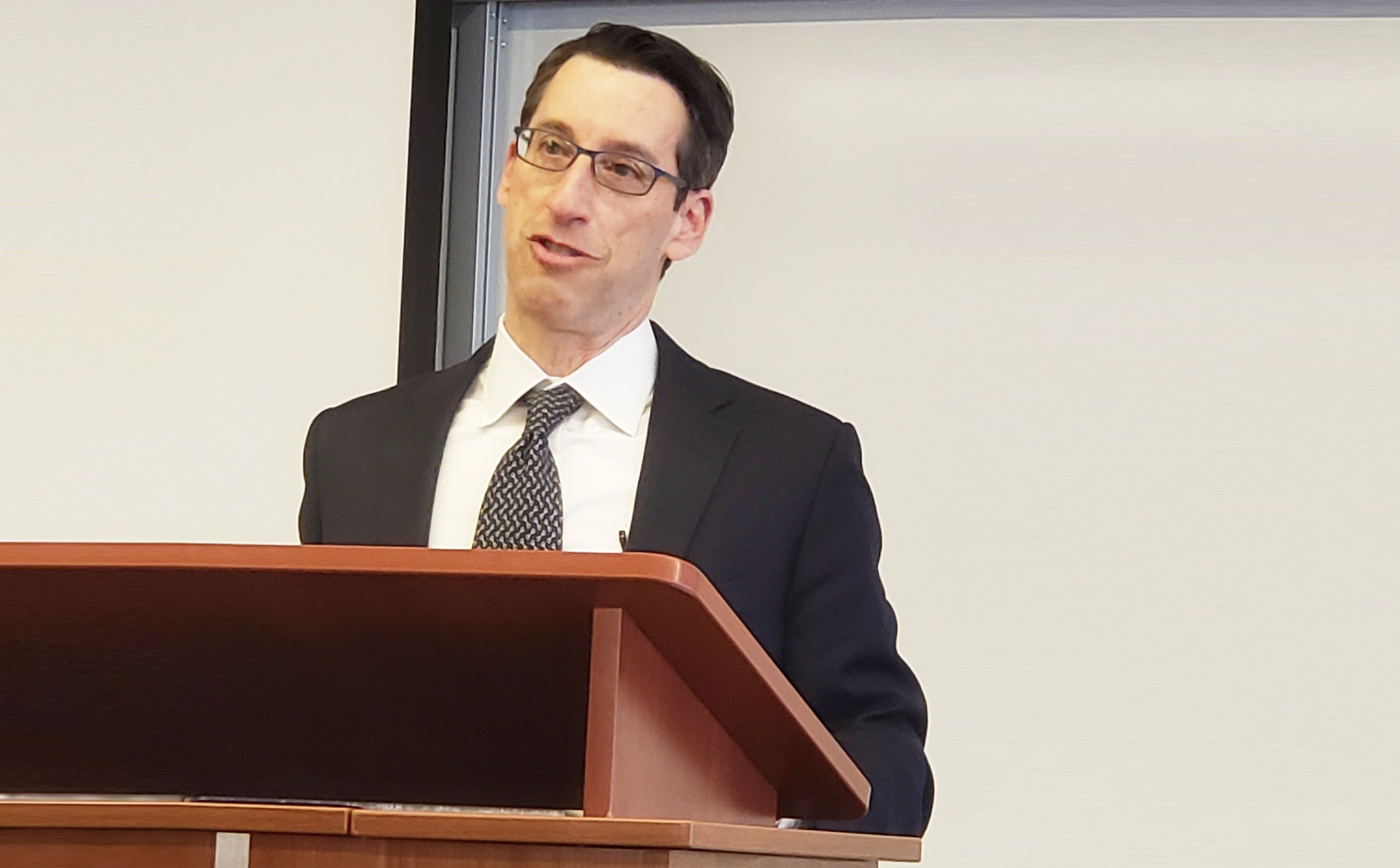Three Challenges for Pharmaceutical Antitrust
By: Mary Quandt
Pharmaceutical antitrust presents unique challenges to antitrust law. Market forces are different for pharmaceuticals than they are for most other products: The party who chooses the product is different from the party who pays for and consumes the product, and this situation is ripe for anticompetitive behavior. SLU LAW student Mary Quandt recaps Distinguished Speaker Professor Michael Carrier’s recent talk on the challenges of pharmaceutical antitrust.
Professor Michael A. Carrier, Distinguished Professor of Law at Rutgers Law School, joined SLU LAW to discuss contemporary challenges in pharmaceutical antitrust law. Professor Carrier is an expert in antitrust law and intellectual property law, and he has written extensively on these subjects. His publications include the leading IP/antitrust treatise, IP and Antitrust Law: An Analysis of Antitrust Principles Applied to Intellectual Property Law, as well as Innovation for the 21st Century: Harnessing the Power of Antitrust Law and more than 130 academic articles and book chapters. Professor Carrier has testified before the FDA, FTC, National Academies, Senate Judiciary Committee, House Judiciary Committee, and House Energy & Commerce Committee, and has served as chair of the Executive Committee of the Antitrust and Economic Regulation section of the Association of American Law Schools. Professor Carrier has also served as a policy volunteer for the 2020 Biden-Harris campaign and served on the 2016 ABA Antitrust Section’s Presidential Transition Task Force.
For his talk for the Distinguished Speaker Series, Professor Carrier discussed three of the biggest challenges he has come across in his work regarding pharmaceutical antitrust. Focusing on the court system, Professor Carrier illustrated how courts struggle with the complexities of pharmaceutical antitrust cases, how these cases do not lend themselves well to the simplicity that courts try to obtain, and the sisyphean task of keeping up with new pharmaceutical developments.
Pharmaceutical antitrust presents unique challenges to antitrust law. Market forces are different for pharmaceuticals than they are for most other products: The party who chooses the product (e.g., a physician) is different from the party who pays for and consumes the product (e.g., the patient). This situation is ripe for anticompetitive behavior. Further complicating the issue for courts, the pharmaceuticals market is complex as is the regulatory regime. Courts must also navigate the particular quirks of legal consequences of pharmaceutical patent law; for example, instead of requiring a preliminary injunction by the court, the Hatch-Waxman Act creates an instant 30-month stay when the owner of a pharmaceutical patent files suit against a generic.
Another challenge for courts is their quest for simple, straightforward solutions. However, in pharmaceutical antitrust cases, even the cleanest solutions can lead to unintentional anticompetitive effects. For example, courts recognize the presumptive validity of pharmaceutical patents to streamline antitrust cases—but courts cannot presume there is also a recognized right to exclude. Furthermore, this presumptive validity can remove antitrust scrutiny. When this is an option, one party can pay the other to drop their patent challenge, which in the long run decreases competition and the benefits which competition pushes.
Last, Professor Carrier described as “sisyphean” the task of staying ahead of pharmaceutical companies’ ingenuity in skirting antitrust laws. If a court helps settle a patent dispute between two parties, the larger party may simply change the color of a pill or medication injection method. Because pharmaceutical patents are so specific, changes to any part of the pharmaceutical can lead to a new patent. The larger company can then promote this newly patented form as best practice. Doing so prevents other companies from being able to produce and market their own generic version. This practice cannot be easily challenged in court as antitrust behavior because a pharmaceutical company need only offer arguments that sound reasonable, such as promoting safety or innovation, to rebut a charge of antitrust violation.
As Professor Carrier showed, pharmaceutical antitrust is difficult to understand, even by learned courts. Yet the importance of understanding and fighting against antitrust behavior is critical to keep pharmaceuticals competitive, innovative, and affordable.
Professor Carrier’s lecture was given in person and via zoom on February 2, 2023 as part of the Health Law Distinguished Speaker Series hosted by the Center for Health Law Studies at SLU LAW. Each academic year, the Center hosts leading scholars and practitioners who shape health law and policy. Students attend keynote lectures in the series and meet with speakers to discuss timely law and policy issues during small group discussions.
